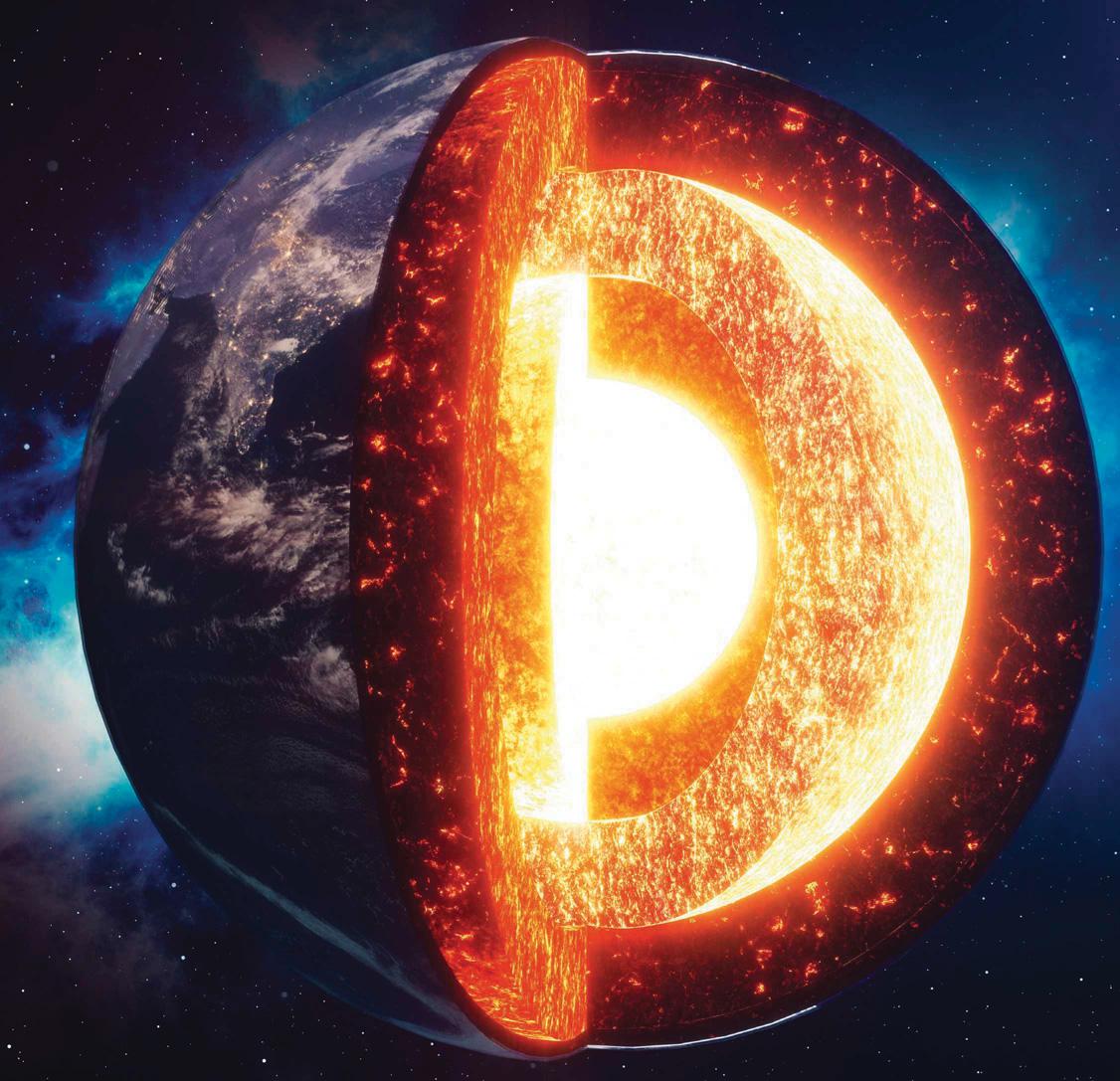Prøve GULL - Gratis
Earth's inner core may be changing its spin and its shape
BBC Science Focus
|March 2025
Changes to seismic waves travelling through the planet could reveal unusual activity in Earth's core
-

It’s not unusual for Earth’s core to change its rate of rotation or even its shape over time — though, as far as scientists could tell, never simultaneously. But new research reveals that something unexpected may be happening deep beneath our feet.
Scientists have long debated the cause of strange changes to the seismic waves triggered by earthquakes when they ripple through the planet’s core. One side argued the core’s rotation rate delays or accelerates the travel time of the waves, while the other claimed that it’s deformation of the inner core causing changes in the waves. In the new study, published in journal Nature Geoscience, scientists from China and the US reveal that it’s likely to be both.
The research shows that, in 2010, Earth’s inner core went from rotating faster than the rest of the planet, to slower. This — along with changes near the surface of the inner core — likely interrupted the seismic waves. Like X-rays as they pass through our flesh and bones, these waves allow scientists to ‘see’ what’s happening inside the planet. The researchers think the discovery could help us unlock more information about the core’s properties and structure.
Denne historien er fra March 2025-utgaven av BBC Science Focus.
Abonner på Magzter GOLD for å få tilgang til tusenvis av kuraterte premiumhistorier og over 9000 magasiner og aviser.
Allerede abonnent? Logg på
FLERE HISTORIER FRA BBC Science Focus

BBC Science Focus
HOW UNLIKELY IS OUR UNIVERSE?
Our understanding of the Universe has revealed that its existence, and indeed our own, relies on a particular set of rules.
1 mins
December 2025

BBC Science Focus
DOES YOUR NAME AFFECT YOUR PERSONALITY?
Research is revealing that nominative determinism isn't as easy to dismiss as you might think
5 mins
December 2025

BBC Science Focus
HOW DIFFICULT WOULD IT BE TO FLY THROUGH THE ASTEROID BELT?
In the 1980 film Star Wars: The Empire Strikes Back, Han Solo and friends try to escape pursuing imperial forces by flying through an asteroid field. Droid C-3PO remarks, \"the odds of successfully navigating an asteroid field is approximately 3,720 to 1\". The scene depicts a chaotic, dense field of rocks swirling and spinning through space. This scenario has been played out many times in the cinema.
1 min
December 2025

BBC Science Focus
HOW CAN I BE MORE PERSUASIVE?
Most of us like to think we're rational people. If someone shows us evidence that we're wrong, we'll change our minds, right? Well, not necessarily, because it's not always that simple. Being wrong feels uncomfortable and sometimes threatening. That's why changing someone's mind is often much harder than it seems.
2 mins
December 2025

BBC Science Focus
This bizarre optical illusion could teach us how animals think
By seeing which animals fall for a classic visual trick, scientists are uncovering how different brains make sense of the world
1 mins
December 2025

BBC Science Focus
LIFE AT THE PARTY
The secret that keeps the superagers so sprightly could be socialising
3 mins
December 2025

BBC Science Focus
AIN'T NO MOUNTAIN HIGH ENOUGH
Could an exoskeleton help you scale every peak with ease? Ezzy Pearson straps on some cyborg enhancements to find out
5 mins
December 2025

BBC Science Focus
A slice across the sky
The green flash slicing through the skies in this shot is a fireball.
1 min
December 2025

BBC Science Focus
TB is surging. Should we be worried?
Cases of the world's deadliest infection are climbing in the UK and US. Why is tuberculosis returning and how do we fight back?
4 mins
December 2025

BBC Science Focus
I survived the worst fire in the history of space exploration and had to keep it a secret
Astronaut Jerry Linenger opens up about one of the worst accidents in space, and the cover-up that followed
1 mins
December 2025
Listen
Translate
Change font size
